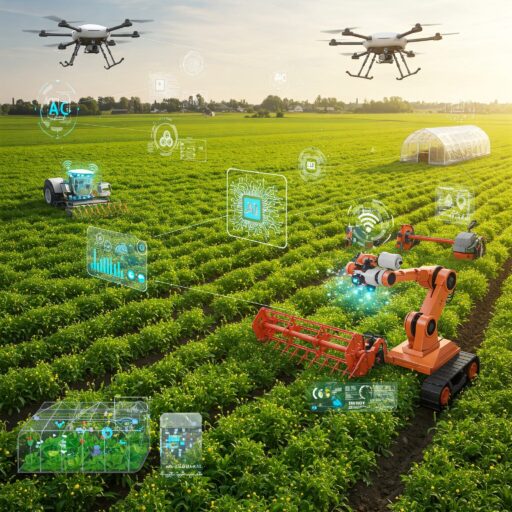AI in Agriculture: Transforming Farming with Artificial Intelligence
How AI is Revolutionizing Agriculture
Artificial Intelligence (AI) is playing a crucial role in modern agriculture by improving efficiency, optimizing resource use, and increasing crop yields. With AI-powered tools, farmers can analyze vast amounts of data, automate labor-intensive tasks, and make smarter decisions that lead to sustainable and profitable farming.
Key Applications of AI in Agriculture
AI is being used in various ways to enhance farming operations. Here are some of the most impactful applications:
- Precision Farming – AI-powered systems analyze soil health, weather conditions, and crop requirements to optimize planting, fertilization, and irrigation, reducing waste and increasing efficiency.
- Crop Health Monitoring – AI-driven drones and satellite imaging detect diseases, pests, and nutrient deficiencies early, allowing farmers to take preventive measures before issues escalate.
- Automated Machinery & Robotics – AI-powered tractors, harvesters, and robotic weeders automate labor-intensive tasks, reducing costs and improving productivity.
- Predictive Analytics for Yield Forecasting – AI models analyze historical data, climate trends, and soil conditions to predict crop yields, helping farmers plan better for the season.
- Smart Irrigation Systems – AI-enabled irrigation technologies ensure optimal water distribution by analyzing real-time soil moisture levels, reducing water waste and conserving resources.
- AI-Powered Pest Control – Machine learning algorithms identify pests and recommend targeted treatments, minimizing the need for excessive pesticide use and protecting crops effectively.
- Supply Chain Optimization – AI helps streamline logistics by analyzing demand patterns, reducing post-harvest losses, and ensuring timely delivery of produce.
- Livestock Management – AI-powered cameras and sensors monitor livestock health, detect diseases, and optimize feeding schedules to improve animal welfare and productivity.
- Automated Greenhouse Management – AI adjusts lighting, temperature, and humidity levels inside greenhouses to create optimal growing conditions for plants.
- Soil Analysis & Nutrient Management – AI-powered soil testing tools assess nutrient levels and recommend the best fertilizers for higher crop yields.
The Future of AI in Agriculture
As global food demand increases, AI will continue to shape the future of agriculture by making farming more sustainable, efficient, and resilient. By integrating AI-driven solutions, farmers can improve productivity, reduce waste, and enhance food security worldwide.
Learn More
Want to explore how AI is transforming other industries? Visit our AI in Industries page to discover its impact on healthcare, cybersecurity, construction, and more.

